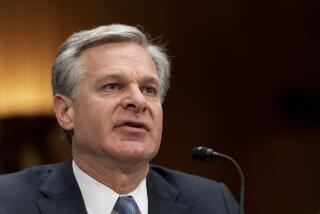Senators criticize FBI and Pentagon in Ft. Hood shooting case
Two Senate leaders concluded Thursday that the FBI and the Pentagon were responsible for a “string of failures” in tracking a disgruntled Army major in the years before he allegedly opened fire at a crowded Ft. Hood, Texas, deployment center, killing 13 people.
Army supervisors repeatedly referred to Maj. Nidal Malik Hasan as a “ticking time bomb,” and FBI agents and the military knew he had become radicalized under the influence of a violent Islamist extremist, the senators said.
Yet the agents never arrested him or even brought him in for questioning, and his military superiors never disciplined him or discharged him from the Army.
“The Ft. Hood massacre should have been prevented,” said Sen. Joe Lieberman (I-Conn.), who along with Sen. Susan Collins (R-Maine) conducted the investigation into the November 2009 shooting on behalf of the Senate Homeland Security Committee.
“People in the Department of Defense and the FBI had ample evidence of alleged killer Nidal Hasan’s growing sympathies toward violent Islamist extremism in the years before the attack. He was not just a ticking time bomb but a traitor,” Lieberman said. “Thirteen people died needlessly at Ft. Hood.”
Added Collins: “This is not a case where a lone wolf was unknown to the FBI, unknown to military officials, until he struck. And that is the tragedy of this case.”
At FBI headquarters, officials said they “agreed with much in the report” and planned to adopt many of the Senate recommendations “as appropriate.”
At the Pentagon, officials are waiting to respond until Hasan’s legal case is completed. Authorities are considering a general court-martial and a possible death sentence.
Lieberman and Collins said they were disappointed that no one at the FBI or the Pentagon had been held accountable. “That is very disturbing,” Collins said.
Hasan, a 41-year-old U.S.-born Muslim who worked as an Army psychiatrist, is accused of opening fire in a soldier readiness center on Nov. 5, 2009. Besides the 13 deaths, 32 people were wounded. Witnesses said the gunman yelled “Allahu Akbar” — Arabic for “God is great” — when he burst into the center.
The senators said the FBI and Defense Department “collectively had sufficient information to have detected Hasan’s radicalization to violent Islamist extremism but failed to understand and to act on it.”
“That string of failures prevented officials from intervening against him,” they said.
They determined that federal law enforcement agents, “to the FBI’s credit,” flagged Hasan for additional scrutiny after learning about his radicalization.
Much of that occurred after Hasan had e-mail contacts with Anwar Awlaki, an American-born, Yemen-based Islamic cleric with suspected ties to Al Qaeda. “I can’t wait to join you” in the afterlife, Hasan reportedly wrote to Awlaki in an e-mail.
There were other signs. During a military medical fellowship, Hasan tried to justify suicide bombings, made a class presentation supporting violent extremism, supported some of the work of Al Qaeda leader Osama bin Laden, and warned that Muslim Americans in the U.S. military “could be prone to fratricide.”
Hasan’s radicalization “was on full display to his superiors and colleagues during his military medical training,” the Lieberman-Collins report said. “An instructor and a colleague referred to Hasan as a ‘ticking time bomb.’ ”
Yet “not only was no action taken to discipline or discharge him, but his officer evaluation report sanitized his obsession with violent Islamist extremism into praiseworthy research on counter-terrorism,” the report said.
The evaluation praised Hasan for his “unique skills” in Islamic studies and said his research into the global war on terrorism had “extraordinary potential to inform national policy and military strategy.”
An FBI-led Joint Terrorism Task Force in San Diego learned about Hasan’s radicalization and passed it on to an FBI task force in Washington. There it sat for weeks.
Yet the Hasan e-mails to Awlaki, who is known to preach violence and is accused of encouraging others to kill for Al Qaeda, should have immediately been viewed as “a shocking course of conduct for a U.S. military officer.” Instead, the FBI read his evaluation reports and agreed that Hasan was probably only conducting research.
The FBI also decided other evidence against Hasan was “slim,” and agents “dropped the matter rather than cause a bureaucratic confrontation,” the report said.
In the end, Lieberman said, “the FBI conducted a superficial inquiry and ended it prematurely.”
When the case was sent to the Pentagon, Lieberman said, an official “waited three months before producing a cursory report that from evidence we’ve gathered took him all of four hours to write.”
More to Read
Start your day right
Sign up for Essential California for news, features and recommendations from the L.A. Times and beyond in your inbox six days a week.
You may occasionally receive promotional content from the Los Angeles Times.







